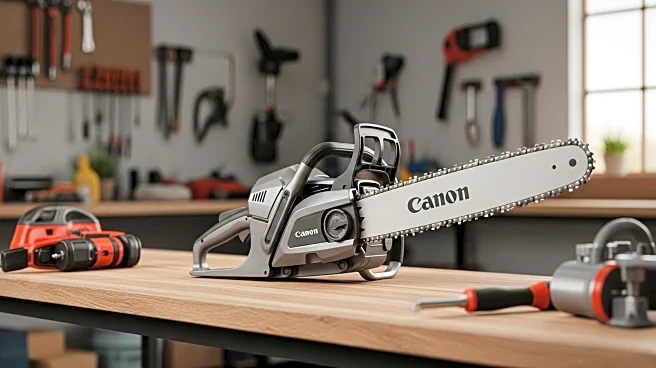What's Happening?
Milwaukee Tool UK has showcased its M18 Fuel dual-battery chainsaw at GroundsFest, highlighting its capabilities in battery-powered outdoor equipment. The chainsaw features a 20-inch bar and two 12-amp batteries, providing a chain speed of 14.3 meters per second. It is designed for felling, offering approximately 110 cuts of soft cedar wood on a single charge. The chainsaw is comparable to a 60 cc petrol saw but with the advantage of low maintenance. The new Forge range batteries include air vents for cooling during charging, enhancing battery life. The chainsaw has been on the market for about a year and is used by a variety of customers, including councils and arborists.
Why It's Important?
The introduction of the M18 Fuel chainsaw represents a significant shift towards battery-powered tools in industries traditionally dominated by petrol-powered equipment. This transition is driven by the need for more sustainable and low-maintenance solutions. The chainsaw's versatility and compatibility with other tools in the M18 range make it an attractive option for professionals seeking efficiency and cost-effectiveness. As battery technology advances, more users are likely to adopt these tools, reducing reliance on fossil fuels and minimizing environmental impact.
What's Next?
As battery technology continues to improve, it is expected that more industries will transition to battery-powered equipment. Milwaukee Tool's focus on innovation and sustainability positions it well to capture a growing market share. The company may expand its product line to include more powerful and efficient tools, further encouraging the shift away from petrol-powered equipment. Additionally, increased adoption by municipalities and professional arborists could lead to broader acceptance and integration of battery-powered tools in various sectors.
Beyond the Headlines
The shift to battery-powered tools like the M18 Fuel chainsaw also raises questions about the future of traditional petrol-powered equipment. As more users switch to battery options, manufacturers may need to adapt their product lines to meet changing demands. This transition could also influence regulatory policies aimed at reducing emissions and promoting sustainable practices in industries reliant on heavy machinery.










